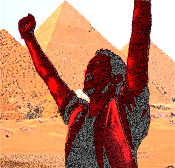|
|

|
|
| Opening of the Red Sea
|
|
When Prophet Musa stood in front of the Red Sea, a tyrant and his army approached from behind. Some of those in Musa's midst began to divide. Looking ahead, those people saw only defeat:
"And when the two bodies saw each other, the people of Moses said: 'We are sure to be overtaken.'"(Qur'an, 26:61).
But Musa had different eyes. His eyes were spiritual eyes that saw through the illusions of worldly hardship and defeat. He saw through. With a heart connected to the Most High, looking at the same seemingly impossible situation, Musa saw only God:
"(Moses) said: 'By no means! My Lord is with me! He will guide me through!'" (Qur'an, 26:61-62)
And indeed Allah did just that: "Then We told Moses by inspiration: 'Strike the sea with thy rod.' So it divided, and each separate part became like the huge, firm mass of a mountain. And We made the other party approach thither. We delivered Moses and all who were with him; But We drowned the others." (Qur'an, 26: 63-66).
Click HERE to read full article.
|
|
|
Listen to the Roar of Freedom
|
|
"Just listen to that roar," urged a CNN
correspondent in Egypt, as thousands of Egyptian protesters charged, fists
pumped, against hundreds of armed Egyptian security forces. What a roar it was,
indeed. The protests have shown the world that Arabs are capable of much more
than merely being pitiable statistics of unemployment and illiteracy, or
powerless subjects of 'moderate' but 'strong' leaders (an acronym for friendly
dictators).
The times are changing, and British MP George Galloway's comment about the Arab
lion roaring again seems truer by the day. The Egyptians have revolted in style,
and their revolution will go down in history books with such adjectives as
"great", "noble" and "historic".
If there is any revolution deserving of the name, it is this one. Thanks to
Egypt, people the world over have been forced to re-think their previous idea of
"Arabs". Even many of us who insisted that the future of the Middle
East could only be decided by the people themselves had eventually started to
lose hope. We were told our words were redundant, sentimental, and, at best, an
opportunity for poetic reflection, but not realpolitik. Now we know we have been
right all along. Egypt is the clearest possible manifestation of the truth of
people shaping their own history - not just in the Middle East, but anywhere.
Click HERE to read full article.
|
|
|
Islamic Internationalism
|
|
One of the more fascinating aspects of Ibn Battuta's travels through the
equivalent of nearly fifty modern countries is that he was repeatedly running
into people he knew. Wandering lost in the remote forests of northern Turkey, he
met up with "an acquaintance," who saved him and his traveling
companions from perishing in a snowstorm. When he tried to make a visit in
cognito to the Maldive Islands in the Indian Ocean, travelers who had known
him in northern India 1,600 miles away recognized him and blew his cover. In
southern China he met a man named al-Bushri whom he had known slightly in India
and who came originally from a town in Morocco only forty miles from Tangier.
About five and a half years later when he was traveling in the northern Sahara
Desert at the opposite extremity of the hemisphere, he became the house guest of
al- Bushri's brother!
In the age of the global village we might not be terribly surprised to bump into
some old acquaintance while changing planes in Tokyo or Frankfurt. But six and a
half centuries ago, when the world's population was many times less than it is
now, cities were much smaller and more widely scattered, vast deserts and oceans
separated settled communities, and the pace of travel was limited to the speed
of horses or sailing ships, we might suppose that few people ever ventured far
beyond their natal land.
Click HERE to read full article.
|
|
|
